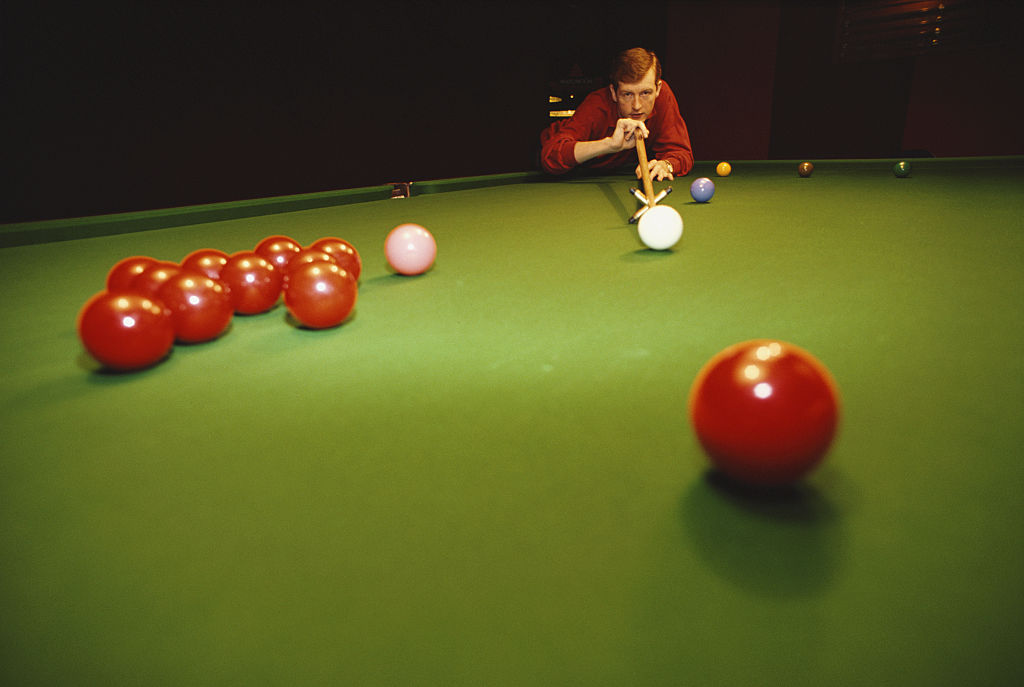How do you walk away from greatness? How do you vacate the position of being literally the best person in the world at something? Most of us never have to face this challenge, but at some point Ronnie O’Sullivan will. In Steve Davis and Stephen Hendry he has contrasting examples of how to tackle it. I’d argue that Davis’s approach is by far the better – and indeed teaches all of us about life and the way it should be lived.
‘If he plays his best, he wins. It’s as simple as that.’ There aren’t many who disagree with Hendry’s verdict on O’Sullivan, his successor as the king of snooker and the greatest player, by common consent, ever to pick up a cue. The astonishing thing is that, unlike Hendry in the 1990s and Davis in the 1980s, O’Sullivan has maintained that greatness into his late forties. Last season he won two of the three big titles, and no one will be surprised if he adds an eighth world crown in Sheffield in May. This remains true even though he has withdrawn from the last few tournaments, escaping the stress that goes with success and stardom. After all, he once took a whole season off and came back to win the world title, a feat no one thought was possible. He really is that great.
But one day, his reign will end. How does he get from here to there? The route taken by Steve Davis was one of a thousand steps, each of them further and further down the rankings. After his last world title in 1989 he never reached another Crucible final. By 1997, his victory in the Masters was a major shock, and all the more enjoyable for that. I interviewed him that summer, finding that his legendary dedication on the practice table had been jettisoned: ‘These days I think, “Fuck it, just have a game”.’ Supremely relaxed about no longer being world number one, he was happily contemplating years of ‘playing poker and drinking red wine’.
Davis didn’t formally retire until 2016, although as his manager Barry Hearn said: ‘Steve, you retired years ago, it was just none of us had the courage to tell you.’ I think the clue to his equanimity about constant first-round exits lay in something he’d said in 1997, when I asked if, at the height of his powers, he’d still enjoyed winning. ‘Not really,’ he replied. ‘It got to the stage where I was only scared of losing.’ By contrast, the occasional victory late in his career brought utter joy. His last great hurrah was at the 2010 world championship, when he defeated the reigning champion John Higgins to reach the quarter-finals.
Contrast this cheerful slide into irrelevance with what happened to Stephen Hendry. The last of his seven world titles came in 1999. Within a couple of years he was suffering from the ‘yips’ (psychological anxiety about delivering the cue), which led to him turning down certain shots, which in turn led to ever more defeats. Like Davis he slid down the rankings, but unlike Davis he couldn’t cope with it. The final straw came in 2012, when he had to play a qualifying match even to reach the world championship. He managed it, but his performance at the Crucible was so abject that he promptly announced his retirement.
You can apply his philosophy to any sort of decline, from however modest a peak. So you need glasses to read these days or you struggle to carry the shopping? It comes to us all
Since then Hendry has worked as a TV pundit, but admits that watching today’s players getting the glory has proved difficult. After finishing his media work at a final he wants to get away from the venue as quickly as possible, because he envies the guy holding up the trophy. Such was the yearning to compete that he even attempted a comeback, although no one – least of all himself – seemed sure what the real aim was. Some of the performances were ‘embarrassing’ (his word), and in one match he lost to his ex-wife’s nephew. The experiment finally came to an end last year.
Hendry has no problem these days in praising O’Sullivan as the greatest ever, though you can still hear a note of pain as he imagines Ronnie finally outstripping him in terms of world titles, the one record on which the Scot maintains a joint hold. If I was Stephen Hendry I’d be sitting there thinking: ‘I redefined what was possible in a sport, I dominated it for a decade, how cool is that? Others have come along and taken my place – good luck to them.’ But then I’m not Stephen Hendry. My highest break is 55, so who am I to say it’s possible simply to turn off that killer instinct and kick back with the pipe and slippers?
Except – Steve Davis has. He was just as dominant in his time as Hendry became later, and yet managed to escape the mental torture. Which path will Ronnie take? A slide down the rankings seems unlikely: he’s always been self-critical, prone to anger at himself for the slightest imperfection. (Hence the pressure from which he’s currently taking a break – it started with him literally throwing his cue in a bin.) Hard to see him carrying on were he to drop out of the top 16, so his exit will be at the top or very near it. But how will he view things after that exit? My money would be on him copying Davis rather than Hendry – Ronnie has never needed snooker as much as snooker has needed him. Just as Davis has his passions outside the game (for instance DJing – he supported Blur at Wembley), so Ronnie has his running, in which sport he has said he’d one day like to coach.
But whichever way O’Sullivan goes, it seems to me that we can all learn a lesson from Steve Davis. You can apply his philosophy to any sort of decline, from however modest a peak. It might be sporting – even average village cricketers find the game harder as they get older – but it’s equally true of life in the wider sense. So you need glasses to read these days, you struggle to carry the shopping, you take longer to get up the stairs? That’s perfectly normal. It comes to us all. Accept it, embrace it even – it’ll show you’re at one with nature and its cycle.
Very few of us get to be a world champion. But we all face life’s downslope. And when we do, it’s time to find our inner Steve. Drink red wine. Play poker. Just have a game.






Comments